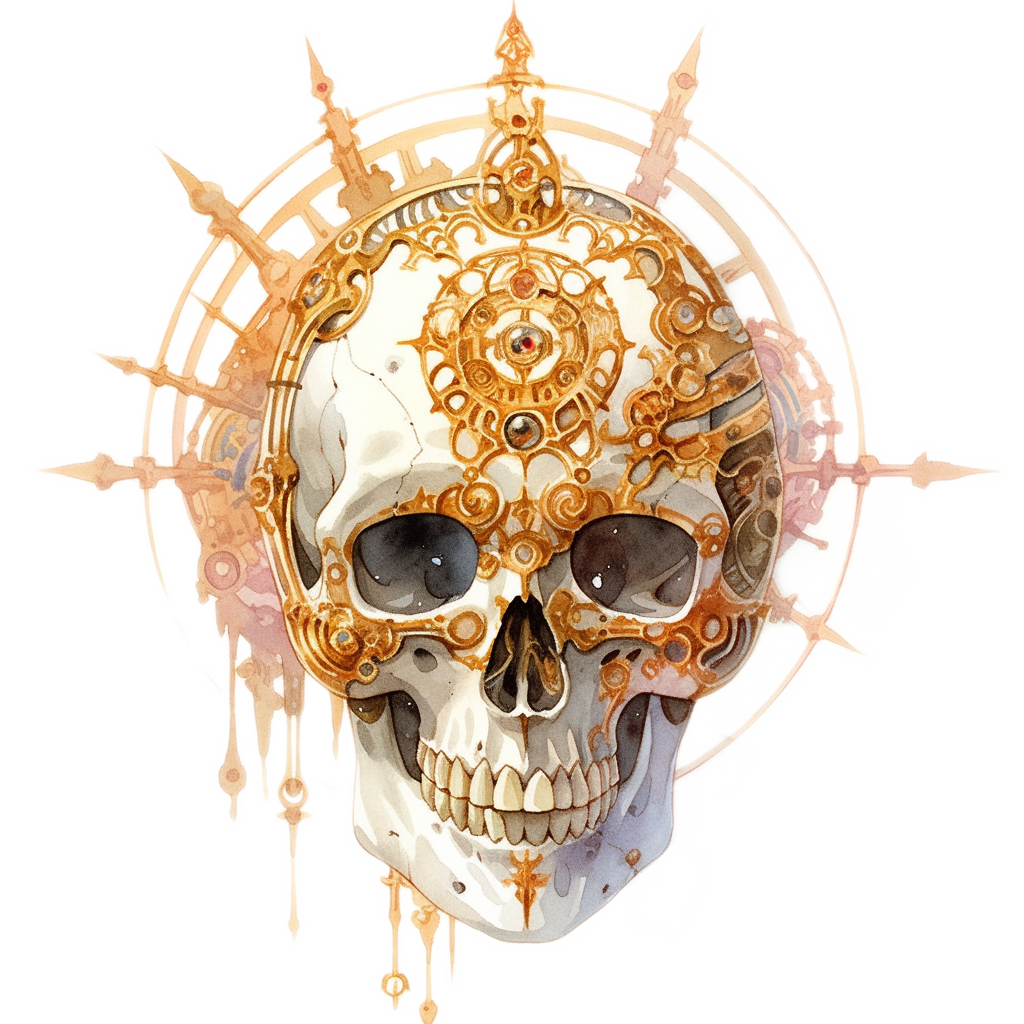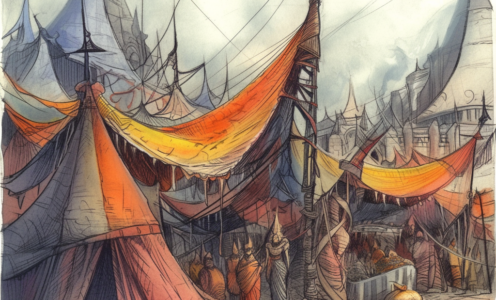Marketplace Eternal
Location: Outlands / Ringlands
Realm: Shared realm of Rosmerta, Sera, Shinare, Waukeen, Zilchus
- Rosmerta the Good Provider. N demipower of fertility, abundance, wealth, material possessions (She/Her)
- Sera the Lady of Fortune. CN intermediate power of wealth, luck (She/Her)
- Shinare the Balance of the Scales. LN intermediate power of wealth, freedom, commerce (She/Her)
- Waukeen the Merchant’s Friend, Liberty’s Maiden, the Golden Lady. N lesser power of wealth and trade (She/Her)
- Zilchus the Great Guildmaster, the Money Counter. LN intermediate power of prestige, power, money, influence (He/Him)
“Ah, the Marketplace Eternal, where anything can be bought…
for the right price”
Welcome cutter, to the Marketplace Eternal, the crossroads of commerce, a burg of wheeling, dealing and gully-peeling. It’s here that the powers of trade, luxury, and wealth converge. This grandest of bazaars isn’t merely a place to shop; it’s a melting pot of divine influence and mercantile might. Here, Zilchus, Waukeen, Sera, Shinare, and Rosmerta mingle their powers, creating a realm where each transaction is a form of blessing, and the clink of coins going into a merchant’s till is like the sweet choral music of a church.
Now, while the powers of trade and commerce each have their own subtle take on the philosophy of trade, they’re all wise enough bloods to realise you can’t have a merchant without a customer, and you won’t get customers unless there’s a reason for them to come. Presumably that’s why they’ve converged on the Marketplace Eternal, a shared realm where trade is literally the lifeblood of the burg. Each of the five powers maintains their own quarter of the realm (apologies to any Mathematicans, please don’t write in), each of which has a distinct flavour influenced by the beliefs of the power, but the chant goes they’re free to visit each other’s kips whenever they like—a rare occurrence amongst most powers.
The Marketplace stretches for miles in every direction, a mostly chaotic jumble of tents and market stalls, with occasional islands of stone shopfronts, grand churches of commerce and trade halls. Fortunately for customers there’s an informal sort of organisation, where traders who specialise in certain types of goods tend to be found close to each other. It ain’t just objects you can trade here though cutter, there’s a place for the buying and selling of services, moneylending, and contracts. And of course there’s got to be some place for the traders and customers to go when they’re not haggling—gambling halls, drinking establishments and inns of variable quality abound throughout the burg. Better believe a shopping tip here can be a multi-day affair. The Marketplace is a place of splendour sure, but it can also be very, very confusing.
The Seat of Luxury
Realm: Zilchus. The Great Guildmaster, the Money Counter. LN intermediate power of prestige, power, money, influence (He/Him)
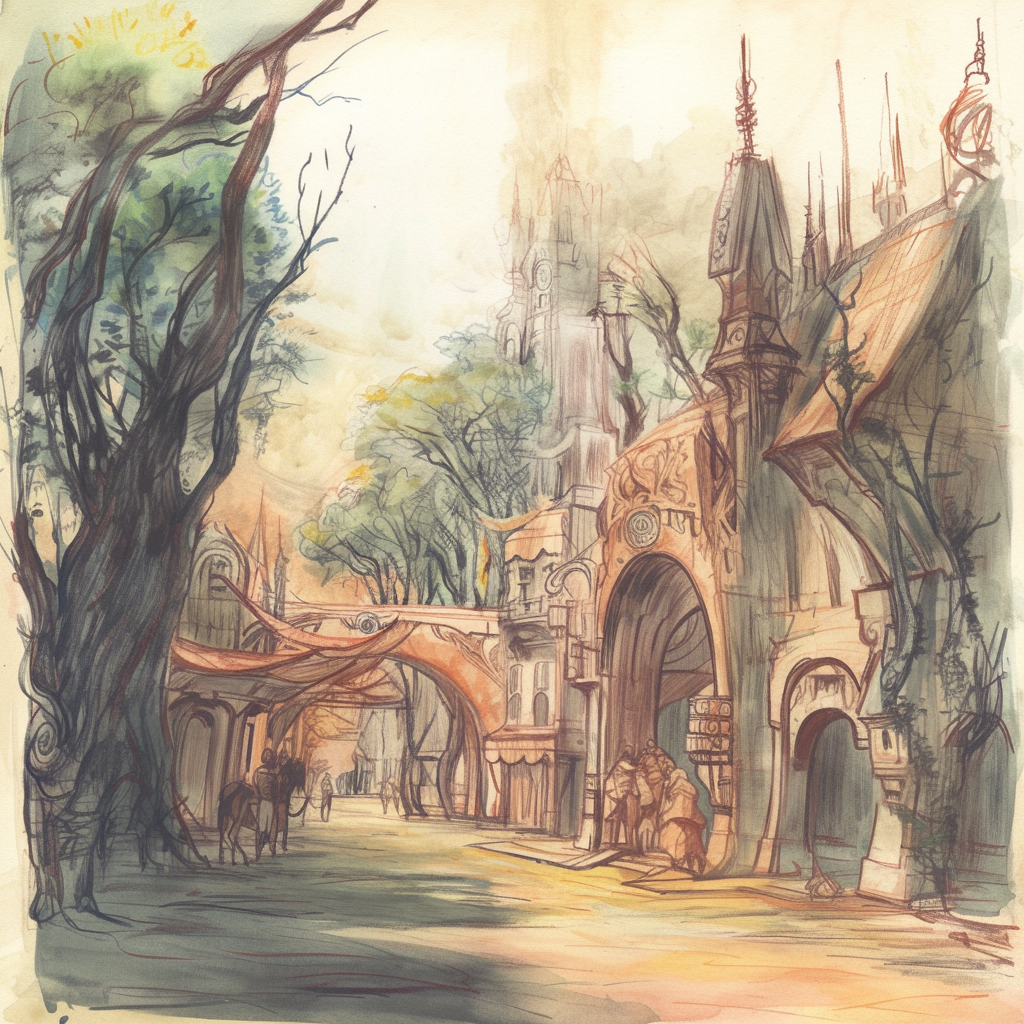
This quarter of the burg houses the grandest trading halls, the finest shops, the most luxurious products—no scrabbling through street markets for the customers here. This of course fits with Zilchus’ domains: Prestige, Power and Influence. This blood is the power who the rich and powerful Oerdians venerate—usually with generous donations of jink to the church. And the priests of the faith love nothing more than being spoiled rotten by the gifts of their patrons, and the blessings that flow from the church are bountiful in turn.
Zilchus ain’t just a power of jink, see? He’s the power of money, prestige and ultimately, the influence jink brings. The Golden Lords of Sigil—that rich, powerful and secretive elite of the Cage—certainly know how to garnish the church of Zilchus, although they’re never uncouth enough to talk about it openly. Chant goes there are plenty of portals connecting the Lady’s Ward to the Seat of Luxury quarter, and it’s the pristine villas and riads of this district that are the holiday homes of the Golden Lords and their families, perfect respites from the bustle of the Marketplace Eternal.
Beyond the palaces are bustling avenues where influence is the currency of choice. Here you’ll find a network of guildhalls and negotiation rooms, where deals are struck not merely on the quality of goods but on the power and prestige of those trading. Here, the philosophy is that wealth is not just about having, but about leveraging what you have to gain more. Zilchus teaches that influence and connections can turn a modest venture into an empire.
In the world of mortals, the desire for money can be overwhelming. If you can control that desire in yourself, while exploiting it in others—that is the key to success and power. Anything done in the multiverse can probably be done better for a profit, and those who recognise these opportunities are one step ahead of any competition. Politics and war are simply two more forms of trade, one using a currency of words and the other, lives; the trick is to spend yours more efficiently than your opponent.
Zilchus’ clerics are ruthless—but scrupulous—in business and are often seen as emotionless. The clergy is heavily involved in business and politics, and conduct deals above or below the table depending on their disposition. They cut deals with powerful merchant cartels like the Planar Trade Consortium and the Gehenna Company, trade and crafts guilds, politicians, or nations, for themselves and the church.
The petitioners of Zilchus are typically merchants and stallholders in the Seat of Luxury, although many are also scribes or accountants in the Hall of Equitable Exchange, a central location where merchants pledge to deal justly, and contracts are transcribed and records kept. The meticulous recordkeeping of the Seat of Luxury serves as the memory of the Marketplace Eternal, a living record of the vast number of exchanges that happen within. It’s also a reminder that even in a place of divine influence, order and accountability still hold sway.
The most common faction colours seen here are those of the Fated, Fraternity of Order and the Merkhants sect.
Prominent Locations in the Seat of Luxury:
- Influence Alley — A derogatory nickname that stuck, given to the grand and frankly un-alley-like courtyards in the centre of the Seat of Luxury where services related to networking and gaining favour are traded.
- Coinclasp Lane — A bustling street where financial services and currency exchange flourish. This is the place where you bring your money so it can make more money. Detractors call it Usury Lane. The Fated faction have a serious foothold here, with their fingers in most of the financial pies.
- Diplomat’s Walk — A quieter lane with upscale boutiques catering to the politically influential. It’s a great place to find really top-notch garnishes, and there are traders that cater for all sorts of tastes. If you need something to impress a fussy factol or an abysmal Abyssal lord, you could do a lot worse than come here.
The House of Barter
Realm: Waukeen, The Merchant’s Friend, Liberty’s Maiden, the Golden Lady. N lesser power of wealth and trade (She/Her)
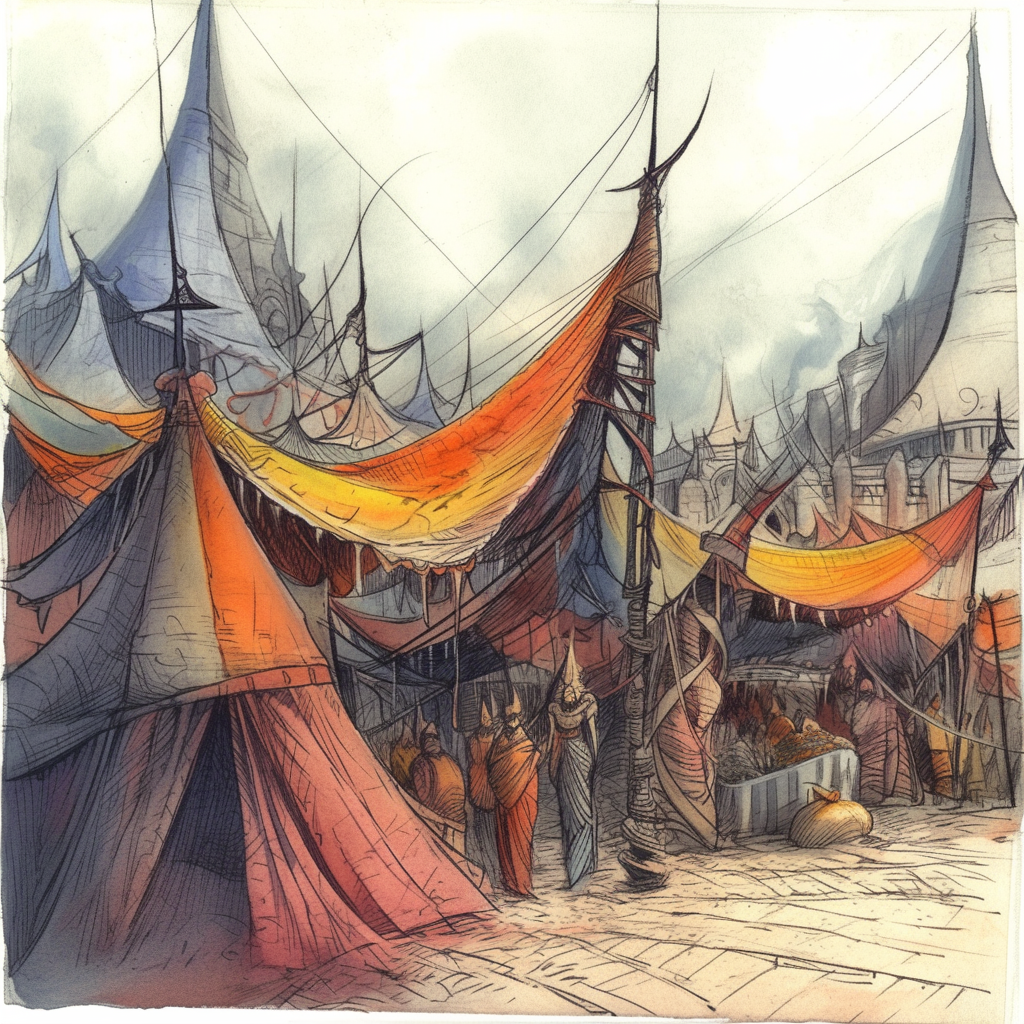
Waukeen, the Merchant’s Friend of the Faerûnian pantheon, embellishes a different aspect of commerce. Her quarter is alive with the spirit of enterprise, buzzing markets, and caravans, where traders from across the planes gather to exchange not just goods but ideas. Waukeen’s philosophy espouses the freedom of trade, the sacredness of the contract, and the belief that prosperity flows from boldness in business. Her realm embodies the idea that wealth comes from seeing opportunities where others see obstacles.
Waukeen is a complex power, and is represented by three aspects; each of these contributes to the character of the House of Barter. As the Merchants’s Friend, Waukeen represents the patron of all kinds of merchants, from the lowliest of peddlers to the grandest of powerful interplanetary trading companies. The bulk of the House of Barter is made up of the Golden Ginnels, a maze-like souk of temporary tents mingles with more permanent shops.
Waukeen is also called Liberty’s Maiden. In this aspect she represents the concept of commerce itself, and the accumulation of wealth through free and fair trade. The dogma of her church reckons that the flow of jink through an economy benefits all, the merchants of course but also the customers being able to get whatever goods they require, the artisans and farmers who produce the goods, and society as a whole as taxes levied on sales are used by the authorities to benefit all of society.
In that respect, the collectors of taxes are begrudgingly respected—while nobody likes giving them jink at least it’s clear where the money goes. Called the Invisible Hand, the church inquisitors of Waukeen ensure the rules of fair trade are followed and, after reasonable expenses are deducted in the form of tithes, the remaining tax money is spent on maintaining the burg’s streets, providing for the poor and defending the realm from bandits and fiends.
The final aspect of Waukeen is the Golden Lady, who is worshipped by cross-traders, smugglers and fences. This seedier side of the House of Barter—called the Goldveil—is well-hidden, but a cutter knowing the right (or perhaps wrong) people, or paying the right tout a good garnish, will find themselves inside un-named and tax free hidden shops.
Prominent Locations in the House of Barter:
- Golden Ginnels — The chant goes that you can buy virtually anything of this diverse, vibrant and chaotic marketplace; the only trick is finding it. A thriving market of market touts has supporting up, who for a fee claim to be able to locate a vendor selling whatever it is you’re looking for. Of course you have to wonder whether you’re getting the best deal—but if a a cutter has more jink than time or patience then this could be a sensible option.
- Alldesires — This is a district for the bards, the singers, and for more ephemeral items and services. Here a cutter can buy the finest musical instruments, magical sheet music, and even bottled songs. The Ephemeral Path is a street where services like storytelling, music performances, and art exhibitions can be found. Dreamweaver Lane is a mystical street selling magical trinkets, potions, and artifacts of illusion. The Muse’s Meander is a scenic street where bards and poets often gather, offering their works and services. With its emphasis on ephemeral goods and the arts, Alldesires delves into the philosophy of yearning, touching on concepts of value, beauty, and longing. The Amphitheater of Dreams is a venue where performances evoke deep emotions and reflections on the nature of desire, and stands as a monument to the understanding that the concept of wealth can transcend material possessions and be manifested in spiritual wealth.
- Cartographer’s Crescent — For those in need of maps, whether they be of the local area, mysterious dungeons, or charts of other planes of existence. All maps are guaranteed to be accurate at the time of creation and are sold in good faith; whether or not the terrain behaves itself and remains the same is another question entirely.
- Brewer’s Boulevard — This is a festive street wihere vendors sell a variety of ales, wines, and spirits, including magical brews that do more than just intoxicate. Cutters can buy by the pint or by the barrel.
- House of Contraptions — A haven for inventors and tinkerers, offering gadgets, gizmos, and all manner of mechanical marvels. Gondsmen of Wonderhome can usually be found here showing off their latest innovations for sale.
- Herbalist’s Hollow — Where healers and cooks alike can find medicinal herbs, rare spices from across the planes, and magical plants for all their potion-making and culinary needs.
- Emporium of Unseen Forces — A particularly chaotic part of the Goldveil to which the Invisible Hand turns a blind eye, and illicit and often downright illegal goods seemingly find their buyers through serendipity. The churches of Zilchus and Shinare in particular have issues with the Goldveil so long as the illicit trading is kept within the House of Barter quarter. Waukeen truly is a power for all kinds of merchants, and the chant goes since her unplanned visit to Azzagrat the cutters of the Emporium have only grown bolder.
- The Golden Palace — Chant goes this magnificent building is the home of Waukeen herself. There are tales for days about the wonders and riches that can be found inside, but not a single soul has been seen entering or leaving the palace since that unfortunate incident between Waukeen and Graz’zt. Fortunately Waukeen was rescued by a band of plucky adventurers, but it seems she’s learned a lesson about security and for the time being at least, it’s absolute.
House of Resolve
Realm: Sera, the Lady of Fortune. CN intermediate power of wealth, luck.
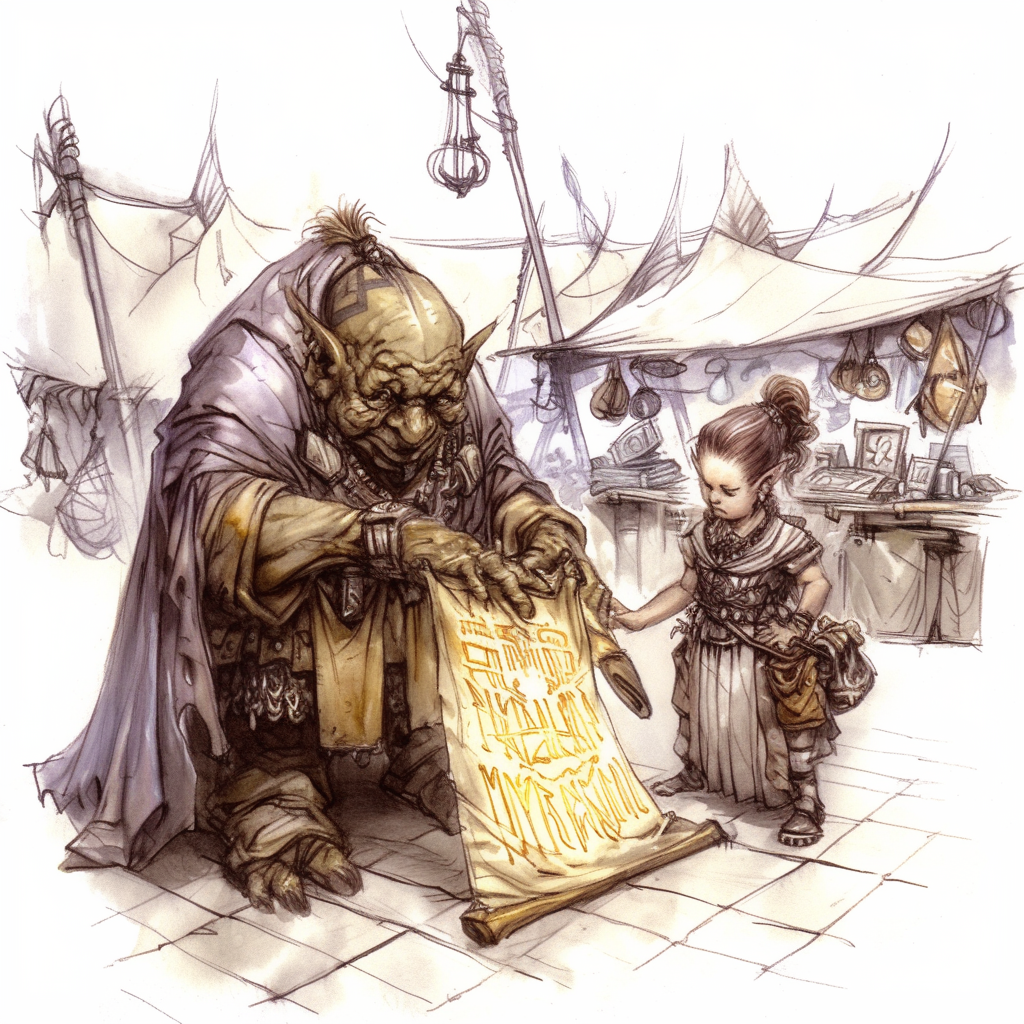
On the Spireward edge of the Marketplace Eternal lies the House of Resolve, a vibrant hub of commerce where the blend of fortune, hard work, and magic creates a bustling district unlike any other. Known mainly for its vibrant community of magic users, this area thrives under Sera’s watchful gaze, underpinned by her union with Ruornil, the Cerilian power of magic. In the House of Resolve, diligence and innovation are rewarded, and the district pulsates with the energy of trade, chance, and arcane discovery.
The architecture of the House of Resolve reflects Sera’s principles: Structures are built with a harmonious blend of functionality and aesthetic appeal, often featuring symbols of luck and prosperity. The streets are crowded with shops and stalls that glow with dancing lights, inviting passersby to explore the wonders within. The air is filled with the murmurs of bargaining, the clink of coin, the gentle chanting of spells and the occasional burst of magical energy from a newly tested artifact.
A more deliciously chaotic side of the House of Resolve emerges at night. As the mage-merchants pack up for the evening, the more playful aspect of Sera’s dual nature comes out; the thrill of chance. While the clergy emphasise the importance of working hard for their coin during the day, they also value playing hard as well. The nighttime brings out the gamblers, the gaming tables and the cutters who’d rather make jink by risking jink.
It’s said that the greatest prize which can be bought in the Marketplace Eternal is a second chance at life.
Prominent Locations in the House of Resolve:
- Bazaar Arcane — At the heart of the district lies the Bazaar Arcane, a sprawling marketplace renowned among spellcasters. Here, enchanters, alchemists, and sorcerers from across the planes gather to buy, sell, and trade magical items and components. The Bazaar is not only a place for commerce but also a forum for merchants of ideas, spells and arcane knowledge, facilitated by Sera’s belief in the power of industry and ingenuity. A portal here to Ruornil’s realm the Silver Lands ensures the ready supply of wondrous items of magic.
- The Hall of Miracles — Part academy, part laboratory, wizards of all kinds can learn, experiment, and collaborate here on new magical creations. Here the clergy of Sera work closely with the priests of Ruornil, blending commerce and magic in pursuit of innovation. The Hall of Miracles hosts regular exhibitions where inventors can showcase their creations, hoping to attract the attention of buyers and patrons. The chant goes the best place to acquire a walking castle is one of these events.
- Enchanter’s End — A cul-de-sac where magic users can find spell components, enchanted items, or even seek enchantment services to add all manner of runes of power to their own gear.
- Familiar Lane — A curious little side street where one can find vendors of all kinds of exotic magical pets, guardian creatures, paraphernalia for the care and dotage of these deightful creatures, and even the occasional mystical companion for sale.
- Fortune’s Balance — This is a grand statue of Sera holding her scales. These scales are said to magically tip in favour of those who have worked hard for their success, symbolising her philosophy that diligence and effort yield the best luck. This monument is a popular meeting spot for adventurers, many of whom leave offerings or touch the scales for good luck before embarking on their next venture.
- The Ridotto — This is the open-air gambling market that opens after night falls in the Bazaar Arcane. It draws gamblers from across the Marketplace Eternal, high-rollers from Sigil and even eladrin and slaadi clientele—although the latter are watched carefully for signs of chaos-shaping or customer-swallowing. A dice game called Hazard is a particular favourite for those who seek fortune through risk. However, this is no ordinary gambling house; the games are imbued with magic, the stakes are often items of power, and the outcomes can be swayed by skill as much as luck. It’s a place where the bold can find great reward, embodying Sera’s philosophy of hard worker takes all.
- The Luckgate — Cutters come here to have their valuables appraised, hoping that some of the luck of Sera will rub off on their transaction and they’ll get a good deal. Prices fluctuate and the quoted price is only good until the next dawn. Many merchants have also set up their stalls here, as well as casinos, games of chance, and places of revelry, all hoping to share in any celebrations of good fortune. Called by some the ‘most honest quarter’ of the Marketplace Eternal, it’s a place where fortunes are made and lost with the turn of a card or the appraisal of a gem. It represents the chance element in wealth, the role of good luck in achieving prosperity.
- Temple of Equity — At the centre of the House of Resolve lies a grand stone keep called the Temple of Equity, where Sera’s proxies hear complaints about vendors and gambling dens in the Marketplace Eternal. The investigators of the church of Sera are called the Evenhand, and the fear of a visit from them is what keeps many merchants of the burg honest. It’s partly their divinely-guided hand and partly the influence of so many powers of fair trade, that have garnered the Marketplace Eternal a reputation where buyers don’t have to beware of cheating vendors.
The Scales of Wealth
Realm: Shinare, The Balance of the Scales. LN intermediate power of wealth, contracts, commerce (She/Her)
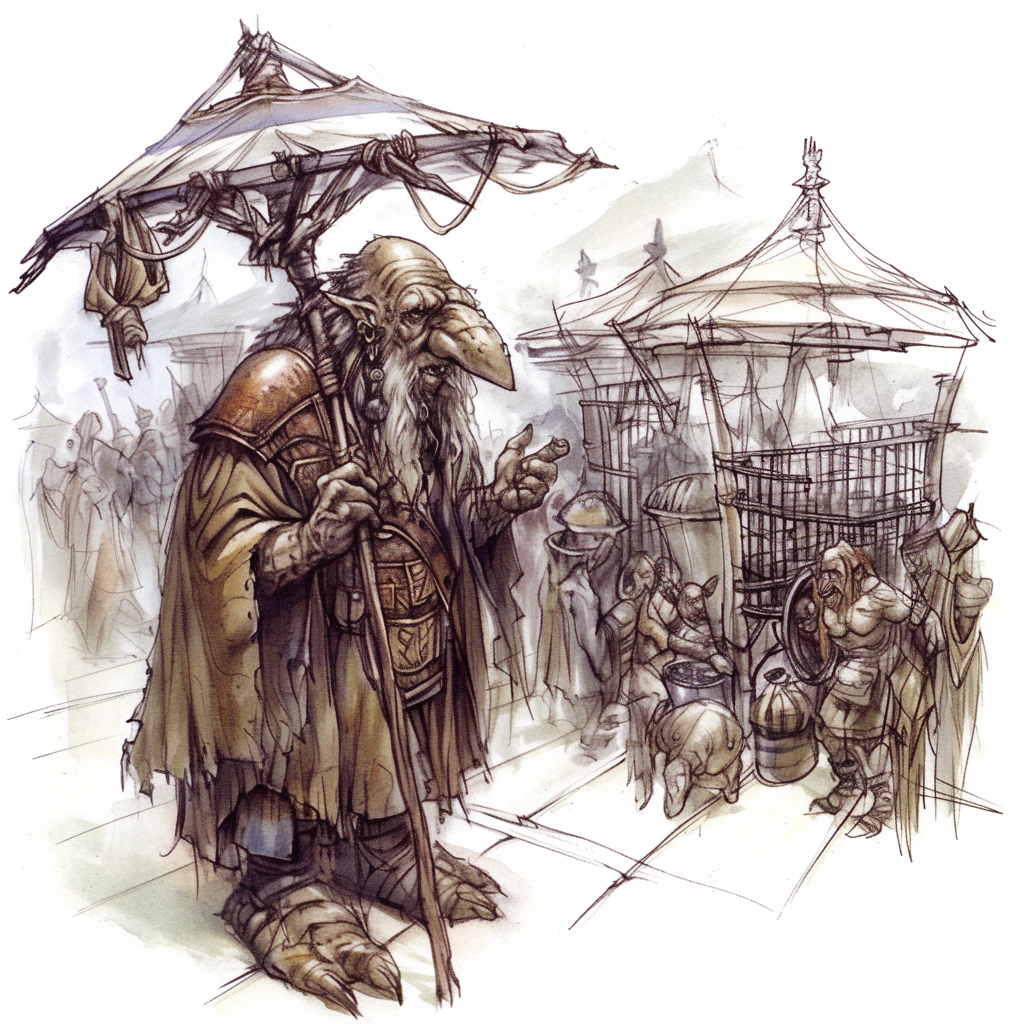
Shinare of Krynn is the power of commerce, wealth and industry. Shinare is the personification of interaction, and expects mortals to grow and improve the more they communicate and interact with others. She governs negotiations, contracts, enterprise and partnerships and oversees the ever-turning wheel of commerce, and as such Is the patron of all those who conduct trade with fairness and conviction. Her quarter of the Marketplace Eternal thrives on the dynamics of trade—the supply and demand, the rise and fall of markets. Followers of Shinare believe that commerce is a living, breathing entity that requires adaptability and resilience. Here, merchants engage in trade with the knowledge that wealth is cyclical, and prosperity is achieved by navigating the ebb and flow of the market with wisdom and foresight.
However, in terms of ethics, Shinare can be a fickle goddess—the priesthood call this flexibility, of course. She’s more interested in the interaction and negotiation between mortals than the motives of the negotiators. Therefore while the Scales of Wealth has a district called the Wheel of Equity, where goods and services are scrupulously checked to be ethically flawless, not far fro this market is the Auction of Allegiance, a controversial and shadowed corner of the Marketplace Eternal. Governed by the pragmatic and indifferent gaze of Shinare, this area operates under a veil of moral ambiguity that belies the bustling trade and negotiation it fosters. The line is drawn, it seems, not at hiring of mercenaries and selling of slaves—which are both permitted—but at unfair practises, theft and abuse, which incurs the wrath of Shinare’s clergy as they violate the spirit of fair interaction she champions.
Prominent Locations in the Scales of Wealth:
- Pact Promenade — An avenue known for its abundance of vendors selling legal services, contracts, and documents of partnership. Chant goes this is where the bottomless purse was invented, and it’s the best place to come to acquire one of those wondrous items.
- The Industrious Foundry — A district renowned for its hardworking artisans who believe in the sanctity of their labour, which embodies the connection between their religious values, work, and economic success. Shinare’s teachings that the balance of financial discipline and frugality drive economic activity is visible in the daily routines of her followers, who seek to balance material success with spiritual fulfilment.
- The Wheel of Equity — Crafts and goods sold here are from fairly traded sources, emphasising ethical commerce. You’ll not find any Blood War diamonds, Soul Gems, cursed items, objects made using enslaved labour, or food that’s been taken from locations of scarcity leaving the local populations hungry. Sure, the prices aren’t the cheapest, but for the discerning ethical shopper—and you’d better believe the celestials can be pretty particular about where they spend their money—you’ll not find a more equitable market outside of Lunia.
- The Auctions of Allegiance — In a start contrast to the Wheel of Equity, this is a place where the principles of free trade are taken to their extreme, with Shinare’s philosophy dictating that the act of commerce itself is sacrosanct, regardless of the goods exchanged. Here, amidst the clamour of negotiation and clinking of coins, lies the slave market—a realm where sentient beings are traded like commodities. Shinare turns a blind eye to the ethical considerations of such transactions. In her view, the exchange between vendor and buyer are paramount. The content of the exchange is secondary to the act of exchange itself, reflecting her belief in the sanctity of commerce over the moral weight of the transactions. The market is a stark contrast to the vibrant, open exchanges found elsewhere in the Marketplace Eternal. Here, the air is heavy, charged with a palpable tension that hangs over transactions. Cages display the unfortunate souls caught in this trade, with buyers inspecting their potential purchases with a dispassionate eye. The market is meticulously organised, with records kept in great detail by the Recordkeepers of the Marketplace Eternal, ensuring that every transaction is noted and every contract sealed. The existence of the slave market in the burg presents a moral quandary that reverberates through the Marketplace Eternal. While some deities and their followers vehemently oppose the practice, Shinare’s followers justify it as a necessary aspect of commerce, arguing that the market provides a venue for interaction and exchange, vital components of Shinare’s domain, and that it is not the place of commerce to judge the goods being traded. After all, other merchants will cheerfully sell weapons of war and destruction without cutters making a fuss. The presence of the slave market has not gone without challenge. Paladins, and clerics of morally driven deities often stage raids and rescue operations, seeking to liberate those enslaved. These actions, while noble, further entrench the market’s defenders, and fuel debates about the nature of trade and the limits of free enterprise.
Cornucopia
Realm: Rosmerta, The Good Provider. NG demipower of fertility, abundance, wealth, material possessions (She/Her)
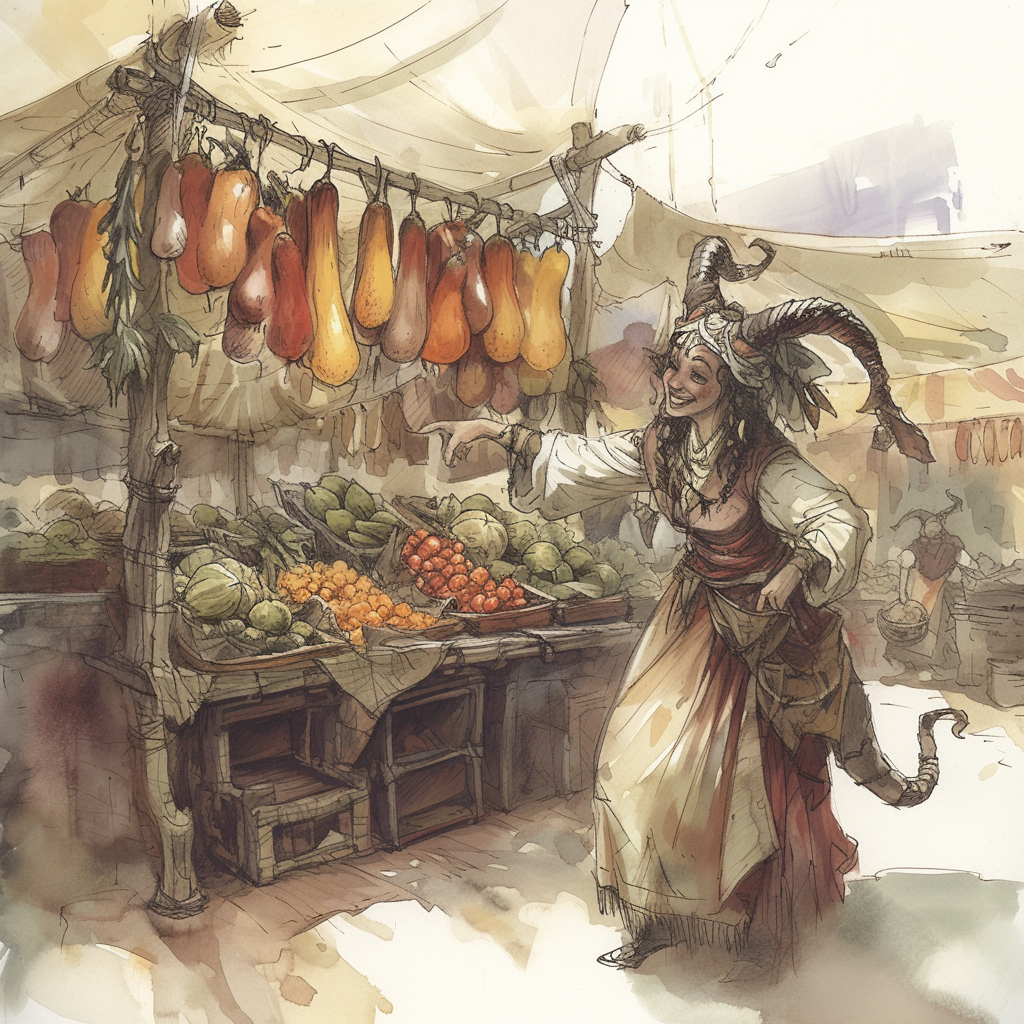
Rosmerta, the Celtic power of abundance and wealth, brings the bounty of the earth to the Marketplace Eternal. Her quarter—Cornucopia—is a celebration of the harvest, where the wealth of the land is honoured and shared, and also an example of trade as a social transaction that seeks to benefit both parties rather than maximise profit. Rosmerta’s philosophy is rooted in generosity and fertility, believing that true wealth comes from the earth and should flow freely among its people. Her markets are filled with the finest produce, and her festivals are a testament to the joy of sharing abundance.
Rosmerta’s philosophy differentiates between “natural” wealth-getting, which she sees as a necessary part of household management, and wealth-gathering through trade, which she views with suspicion. Her tenets hold that the pursuit of wealth for its own sake is unnatural and morally problematic. She advocates for a concept of economic justice, where transactions aimed at fairness and balance, ensuring that neither party in a trade is exploited.
Rosmerta’s celebration of abundance and generosity contrasts in particular with Zilchus’ focus on accumulating wealth and influence. This has lead to tensions over how wealth should be distributed within society. A famine struck the chaotic side of the Outlands a few years back. Rosmerta’s farmer-priests wanted to distribute grain reserves freely to alleviate suffering, while Zilchus’ clerics argued for selling it at market price to fund future investments in better farming practises.
As the goddess of material possessions and prosperity, she is more outward-looking than many of the insular Celtic powers. The Cornucopia celebrates the abundance of the harvest and the joy of sharing. Her markets draw caters from across the multiverse to the Marketplace Eternal, and places her clergy-farmers in a unique position to gather information and understand what’s happening all around the planes. Rosmerta frequently brings back valuable darks for the Daghda and his court that have been gleaned from market chatter.
Prominent Locations in the Cornucopia:
- The Garden of Plenty — This is an area within Cornucopia that provides wholesome food freely to all who visit regardless of their ability to pay in jink, exemplifying the belief that wealth lies in enhancing lives of every individual. Rosmerta’s philosophy that true prosperity comes from expanding freedoms is reflected in the open and generous spirit of her realm. Of course, this generosity is not unnoticed by the more mercantile-minded powers of the Marketplace Eternal, and is a bone of contention with food merchants in other quarters, who complain that giving away food for free undermined their businesses. Rosetta’s clergy are quick to point out that food is exchanged for the promise of future favours, or donations to good causes when the cutter taking the food in in a better position.
- The Festfield — This district is renowned for its eateries, restaurants and street food offering delicacies from across the Great Ring and beyond.
- Abundance Alley — This street primarily sells goods wholesale in large quantities, from farmers to merchants who will then travel elsewhere. Driven by Rosmerta’s philosophy of sharing wealth, this is the place to score a real bargain—if you can manage to carry it.
- Tradewind Square — An area in Cornucopia with a constant flow of new goods, chant and ideas from distant lands.
The Marketplace Eternal — a Summary
Each of the powers in the Marketplace Eternal offers a different perspective on wealth and commerce, reflecting the multifaceted nature of trade. Their followers, from the crafty merchants of Zilchus to the generous hosts of Rosmerta, all find a place within this grand bazaar. Here, in the mingling of divine philosophies, the Marketplace Eternal thrives – a testament to the power of commerce to bring together the most diverse of realms and ideologies.
There’s a whisper amongst the Athar that the five powers of the Marketplace get along a little too well, considering their differing attitudes and competing marketplaces. Their chant goes that these powers are all really the same entity, which presents multiple fragments of itself favoured by slightly different philosophies in order the draw in as many worshippers as possible. Of course, they then go on to colour this theory darker, claiming the being is one motivated purely by greed and avarice and at that point most bashers listening switch off; it’s the old Athar screed again. But perhaps they have a point—after all, these five powers do share a realm and if they are distinct beings then surely there must be tensions between them? The jury is out.
Canonical Sources:
- On Hallowed Ground
- For Duty & Deity [2e]
- Manual of the Planes [5e] p82 & 85, brief mention
- Canonwatch: OHG gives scant information on the burg beyond the names of the quarters; the detail here has been interpolated from a close reading of descriptions of the powers themselves (mainly from the fan wikis listed below) and trying to make each quarter of the burg have a different vibe. Rosmerta is a power of trade mentioned only by name in the OHG entry for Lugh so I’ve fleshed her out based on research into real world mythology. The Marketplace Eternal needed a good-aligned mercantile power so that’s what she’s become.
Sources:
- Jon Winter-Holt, mimir.net
- Ravens Mark Wiki
- Forgotten Realms Wiki
- Spelljammer Wiki
- D&D Deities Database
- GreyhawkOnline
